14 Feb Morocco — Requiem for a Marriage Festival
Imichil, so the story went, was a village in the High Atlas Mountains where, on the last weekend before the snows closed the passes, Berber shepherds come down from even higher in the mountains to lay in supplies for the winter. And to pick up a bride or two.
For a lot of girls in Morocco, marrying a shepherd from the High Atlas seemed to be the pinnacle of romantic ambition and, on the appointed weekend, the village hosted a marriage festival where the two groups could get together.
The problem was, nobody knew which weekend, only that it happened sometime toward the end of September. like butterflies returning to their trees in Mexico, the girls seemed to know, and congregated in Imichil to await the arrival of the shepherds.
Peg and I landed in Casablanca on a Wednesday night in late September and checked into a cheap hotel. The next morning, we were at the front desk inquiring how to get to Imichil.
“Sorry,” the desk clerk informed us, “there’s no such place.”
“It’s in the High Atlas,” I said, pointing to a map. “Right here.”
“You’re pointing to the High Atlas,” the desk clerk said. “You don’t want to go there.”
“Yes, we do. For the marriage festival.”
“Marriage festival?” the clerk gave us a look like we might not be completely legitimate in the marriage department, ourselves. “There isn’t any marriage festival.”
“He’s right, the manager came over. “There’s no such thing as a marriage festival.” Then, so we’d be sure to get the picture, “And even if there were, it happened last week.”
“Maybe we could rent a car and see for ourselves,” we said, and set out to find a car rental agency.
There’s nothing like visiting a car rental agency in Morocco to persuade you that you don’t really want to rent a car in Morocco. So, back in the hotel lobby we were still trying to figure out how to get to the marriage festival when a shadowy-looking guy edged up to us. “Hey, Buddy,” he said. “Want to go to Imichil?”
We retrieved our bags and, looking nonchalant, followed Shadowy Guy out of the hotel and around the corner where the manager and desk clerk couldn’t see us, walked a few blocks and waited on the side of the street. After a while a car eased to the curb, a kid stepped out, stashed our bags in the trunk, and away we went. The kid was named Abdul, and it turned out he wasn’t really a kid. Twenty, twenty-one I’d guess.
Abdul was a gypsy tour guide, and I liked him from the start. Unlicensed tour guides spring up all over the world and, in most places, not having a license just means they’re not paying off a bunch of corrupt officials. Which also means they can charge about a third what we’d have to pay an official guide.
Abdul drove us south out of town, then through farmland that became sparser the farther south we got. And green, again, from the year-round snowmelt as we approached the High Atlas. Then into the mountains where the landscape took on the bleak look of Alpine valleys the world over until, about sunset, we arrived at what, to Western eyes, was a drab, one-street village on the steep backslope of a ridge
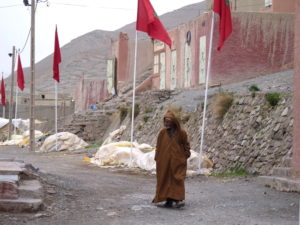
but, to Berber shepherds, was the source of luxury and comfort. And, for a few of them, love.
Abdul found us a room on the second floor of an establishment that wouldn’t have passed fire code in Seventeenth Century London, where he slept on a table in the storeroom, the residents used a common squat toilet and the proprietor offered to put clean sheets on our bed, if that’s what we wanted. We’d nailed the very weekend of the marriage festival and, in a village overflowing with mountain shepherds, hopeful bachelors from surrounding villages and eager young brides-to-be, we felt like we’d won the lottery to have a place to sleep at all.
There are other villages in the High Atlas where shepherds could lay in supplies for the winter but Imichil was the go-to place because Imichil was the one with the most evocative geography: two nearby lakes, Isli (His) and Tislit (Hers) formed from the tears of a boy and a girl from different tribes who cried themselves to death when their parents wouldn’t let them see each other. After it was too late to make any difference, the bereaved parents organized a marriage festival to celebrate what might have been.
The festivities took place in a classic North African souk that had popped up for the occasion selling everything from baby clothes to carpets to fresh vegetables.
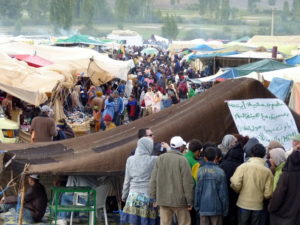
In fact, “souk” is what the locals call the festivities. “Souk Aam.” “Aam Market,” in English. A market for fathers to showcase their girls to a crowd of potential admirers. And I do mean girls.
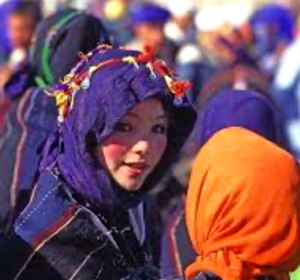
The eligible men, their future husbands, appeared to be in their mid-twenties, but the average girl looked about fifteen. Some weren’t nearly that old, scared-looking children you hoped were just there for practice and not because somebody thought they were wife material.
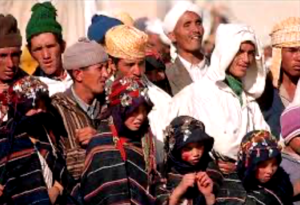
Others seemed to have broken loose and were wandering in groups, bunched close together as if they didn’t know what to do with so much freedom.
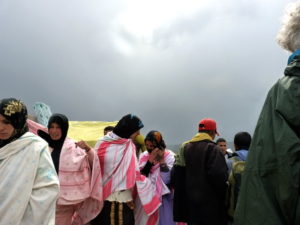
And, I think, feeling very racy, cheeks sometimes daubed with lipstick, as if they’d never had the chance to learn about makeup.
The real ornamentation was their clothing . . . scarves and ribbons and sequins to attract the notice of the young men wandering through the market.
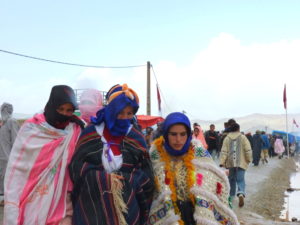
Pounds of scarves and ribbons, kilos of colorful cloth and embroideries that must have become ever more burdensome in the rain that fell all weekend.
Whatever they talked about once the guys introduced themselves, the conversations must have been pretty awkward. In the Lands of the Prophet, twenty-five-year-old men are as cloistered as fifteen-year-old girls. Which makes them the largest consumers of porn on the planet, and gives them the same strange notions about women that thirteen-year-old boys have in the rest of the world. However it works, it does work. Sometimes. Girls announce, “you have captured my liver,” and the couple become engaged.
Friday and Saturday were for getting to know one another, Sunday was a mass wedding and, Sunday evenings the new brides departed for a lifetime of winters in caves in the High Atlas with their husbands, his sheep and, in some cases, wives from previous provisioning trips to Imichil.
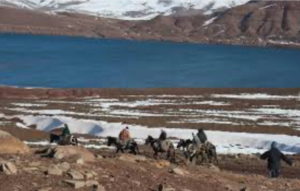
When the festival ended, we climbed into the car and headed for Fes but didn’t get far before Abdul pulled to the side of the road and Amina hopped in. For the next two-and-a-half weeks, we were two couples travelling as man and wife. None of this dehydrating themselves to death through fruitless crying for these kids. Abdul and Amina were a modern-day couple; if people didn’t approve of what they did, they’d do it where the people who didn’t approve didn’t know who they were.
You had to hand it to Abdul. He’d not only figured out how to avoid giving part of his earnings to crooked government officials, he’d figured out how to have an actual grownup relationship with a woman. I’d like to know what became of him. He’s going to go far in this world, and I’d love to follow his progress.
Three Septembers later when we lived in Morocco my son, a couple of friends, and I returned to Imichil. The village was still there, and the souk and, this time, it wasn’t raining. But there were no fathers showing off young girls. No captured livers. Just a North African music festival with tambourines and drums and ouds.
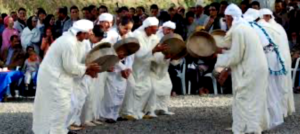
Word was that the entire operation had been co-opted by one of the Makhzen, the hangers-on at the Palace, as a money-making proposition. Together with the royal family, the Makhzen control 62% of the wealth in the country.
On the street where we lived in Rabat there used to be a vibrant little green market: stands filled with bright oranges and pomegranates and vegetables, some arrayed with flowers, all run by smiling families. People would come from every part of town and shop right from the windows of their cars. Until the day the families were put out of business by police batons when a modern supermarket, partly owned by the Palace, thought they were cutting into business. The same people . . . Arabs from the north . . . who’d destroyed an ancient festival in the High Atlas that, for centuries, had been part of Berber culture.


No Comments